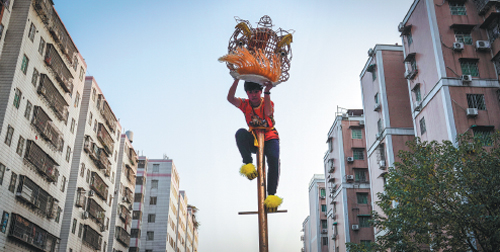Dancing to the beat of the drum
In Qingchuan Sugong Temple in Chebei village, Guangzhou, South China's Guangdong province, drums beat methodically, as a group of students practice lion dancing. It was bitterly cold and windy outside the ancestral hall, but inside was warm and action-packed. The hall was not heated with radiators or electric fires, but the teenagers used their passion for dance to dispel the chill of winter.
Similar scenes were taking place in Tianhe district, Guangzhou, where there are dragon and lion teams in almost every village. Walking into many urban villages such as Shipai, Chebei and Liede, you will be pleasantly surprised to find a group of "lion" dancers.
Half squatting, straightening the waist, raising both hands horizontally-"time starts". The older sister gave an order, and the members of the Chebei Dragon and Lion Sports Association quickly adopted their equine stance. The clock on the wall was ticking, slowly, and some of the team members were feeling the strain. Their legs began to buckle slightly.

From left: At Family Li's Ancestral Hall in Tianhe district, Guangzhou, the Liede Dragon and Lion Youth Team is busy in training; Ling Xueqian wraps himself in a lion head; in Qingchuan Sugong Temple, teenagers practice the basic steps of the "bench lion". SONG JINYU/FOR CHINA DAILY
Ling Xueqian, 21, acted in a standard manner and remained motionless until the older sister ordered stop. This is Ling's sixth year of practicing lion dance. "Only by practicing the basic skills can you get to the lion's head," he says.
Ling was fascinated when he saw a lion dance on the street when he was a teen. He then joined the dragon and lion team in the village. In high school, Ling trained after class, and he was given a chance to become the lion's head after three months with the team. He had to bear the pressure of his parents' opposition and practice secretly. But he still faced obstacles, not least parental disapproval. Despite this, Ling did not give up. "It is because of practicing the lion dance that I learned to persevere," he says. He had never been so persistent in any other thing. Lion dance has become an integral part of his life.

Chen Zhiyan, a 16-year-old girl from Guangzhou Taisheng Dragon and Lion Troupe, practices "one pillar propping up the sky" on a high pole. She has practiced lion dance for three years and has good martial arts skills. She is now the "big sister" in the team. SONG JINYU/FOR CHINA DAILY
The Tianhe Lion King Cup started in August 2016 and has been held for six consecutive years. In 2016, Chen Huijun, who studied martial arts, started a class in Liede village. In 2018, the competition added a primary school category, and Chen contacted Liede Kindergarten to select children to form a team to participate. Unexpectedly, the Liede Dragon and Lion Youth Team, which incorporates dance elements, were an outstanding success and their performance resonated with the audience.
For Chen, the most noteworthy achievement is to keep lion dance relevant. She came from a family of martial arts in Zhaoqing, Guangdong. After relocating to Liede, every time she heard the drums of the village troupe, a sense of excitement arose. Every Friday and Saturday night, Chen leads the Liede Dragon and Lion Youth Team for intensive training, and her two children also join in. There are gongs and drums from the quaint ancestral hall, and across the road is Guangzhou's elite central business district. In recent years, many government units, schools and social organizations have invited Chen to teach lion dance, and she often holds charity classes in the streets and communities.

From left: Teenagers from Guangzhou Taisheng Dragon and Lion Troupe practice caiqing, a technique with which the lion dancers climb up the "human ladder"; teenagers practice jumping on desk; teenagers in training attract a crowd. SONG JINYU/FOR CHINA DAILY
The dragon and lion team opened its door to welcome interested teenagers. Up to now, the Chebei Dragon and Lions Sports Association has trained more than 100 team members without charging tuition fees. Su Mingxin, the person in charge, says that the team is sponsored by the elders and people who care about the art in the village, and is allowed to train in Qingchuan Sugong Temple in Chebei village. The daily operation cost is mainly maintained by commercial performances.
As the Spring Festival approaches, Su has received many performance invitations and is currently stepping up her training. Su realizes that without newcomers, it will be difficult to pass on the lion dance.



 Print
Print Mail
Mail

